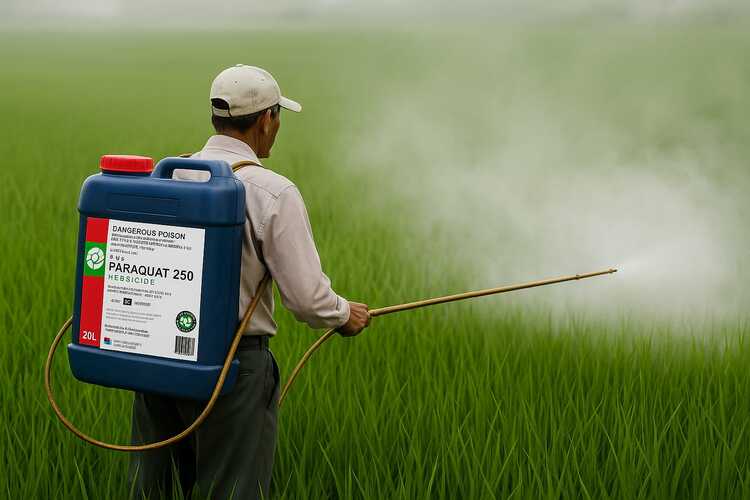Rising health concerns over popular weedicide
Article Today, Hyderabad:
The use of Paraquat a widely-used herbicide in India and the United States, is drawing serious health concerns. Studies show that prolonged exposure to Paraquat increases the risk of Parkinson’s disease, a debilitating neurodegenerative condition. According to a report by The Washington Post, American farmers exposed to the chemical have developed early symptoms such as hand tremors and difficulty in walking. The same pattern is now emerging in India, prompting calls for an immediate ban.
The American experience sparks global worry
Paraquat is classified as a highly toxic herbicide. Research confirms that it harms the nervous system and may trigger long-term diseases like Parkinson’s. The Washington Post featured the story of David Gilbert, a U.S. farmer who used Paraquat for five years and was later diagnosed with Parkinson’s. His symptoms included shaky hands and trouble with mobility. With more such cases coming to light, American civil society is urging the government to impose a complete ban. Although the U.S. has introduced some restrictions, it has not outlawed the chemical entirely. On the other hand, over 50 countries — including China and those in the European Union — have already banned Paraquat.
Widespread usage in Telangana and Andhra Pradesh
In India, Paraquat dichloride is used extensively on crops such as cotton, paddy, wheat, maize, and sugarcane. The Central Insecticides Board and Registration Committee (CIBRC) has officially approved its use. As a result, states like Andhra Pradesh, Telangana, Maharashtra, and Punjab see widespread application. Farmers prefer Paraquat for its lower cost and effectiveness. However, its continued use raises critical questions about regulatory oversight and public safety.
Lack of protective gear puts farmers at high risk
One of the gravest concerns is the casual handling of this hazardous chemical. Paraquat is deadly even in small quantities. Absorption through the skin or inhalation can lead to permanent neurological damage. In India, many farmers do not wear gloves, masks, or any other protective gear while spraying the herbicide. This direct exposure makes them highly vulnerable. Alarmingly, Paraquat is also frequently used as a means of suicide. Since no antidote exists, fatality rates among poisoned victims range from 50% to 90%.
Medical community demands immediate ban
Doctors and public health experts are now calling for urgent action. Associations like the Healthcare Reforms Doctors Association (HRDA) and Doctors Against Paraquat Poison (DAPP) have urged the central government to prohibit the manufacturing, sale, storage, and use of Paraquat. They insist that the existing stock be recalled and safely neutralised to prevent further harm.
Why is it still being sold?
Despite being banned in several countries, Paraquat continues to be legally sold and widely used in India. This raises critical ethical and policy questions. Why should a chemical known to be lethal continue to circulate in Indian markets? Farmers in Telangana and elsewhere deserve better protections, and the time for decisive regulatory action is now.




I absolutely love your website.. Very nice colors & theme.
Did you create this web site yourself? Please reply back as I’m planning to create
my own site and want to know where you got this from or
what the theme is named. Thanks!
Thanks for the comments. yes of course we only created this website